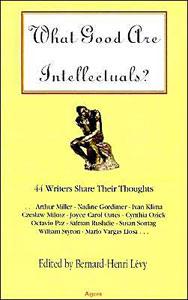
Sound Bite
(Translation of Les Regles Du Jeu) Under the editorship of Bernard-Henri L�évy
In an intimate dialogue with some of the world's best minds, 44 of the world's most respected authors reflect on life, death and meaning through of essays, interviews and responses to the question, "What good are intellectuals?"
Essays include remarks by Wietske Venema, on the eve of his suicide, recorded by Rosalie van Breemen, and excerpts from Marc Lambron's journal detailing cultural pre-occupations in Paris from Egyptomania to astrology and gender issues.
Compelling, stimulating ideas are presented in individual segments; this is a book that can be put down and picked up again like a conversation with a lifelong friend.
About the Author
The editor, French intellectual Bernard-Henri Lévy, was one of the leaders of the "Nouvelle Philosophie" (New Philosophy) movement in Paris in 1976. he has been interviewed on Charlie Rose and his 30th book, American Vertigo, was serialized in Atlantic Monthly.
As New York Magazine said in 2006, "Bernard-Henri Lévy took the first major step toward becoming [a celebrity known by his initials] BHL when he published the book Barbarism With a Human Face (1977), attacking his fellow intellectuals’ fascination with Marxism. It established the patterns of his life and notoriety: anti-totalitarian, internationalist, atheist, and what he calls “anti-anti-American.”'
His 31st book, Left in Dark Times: A Stand Against the New Barbarism, was released in 2008.
|
|
About the Book
What Good Are Intellectuals was originally published in Paris as the 1998 edition of an annual series entitled The Rules of the Game: Literature, Philosophy, Art, and Politics under the direction of Bernard Henri-Lévy. The first half of the...
What Good Are Intellectuals was originally published in Paris as the 1998 edition of an annual series entitled The Rules of the Game: Literature, Philosophy, Art, and Politics under the direction of Bernard Henri-Lévy. The first half of the book offers essays by and about Paul Bowles, Marc Lambron, Michel Onfray, Gilles Hertzog, Wietske Venema, Cécile Guilbert, Yann Moix and William Styron.
Paul Bowles talks about Camus and Sartre, and Camus's observation that American writers were the only writers in the world who don’t feel the need to be intellectuals as well. "That’s funny," observes the interviewer.
"Do you agree with that definition?"
"Yes, yes, I do, because the Americans aren’t capable of becoming intellectuals."
"What do you mean?"
"I mean that they aren’t intellectuals, and if you aren’t an intellectual, you can’t pretend to be one."
"Camus sees that almost as a freedom. Instead of the obligation that some people feel, 'I am a writer, I have to become an intellectual,' they don’t have to justify themselves, they don’t have to defend themselves philosophically."
"Even if they wanted to be intellectuals, they couldn’t be. That’s all I’m trying to say."
"Why not?"
"Because they are far less cultivated. There is far less culture behind the Americans than behind most Europeans. In Europe, there is a continuous, flowing culture. In America, everything is fragmented."
|
|
Pages 276
Year: 2000
LC Classification: HM728.W49 2000
Dewey code: 305.5'52'0904'dc21
BISAC: LCO010000
Soft Cover
ISBN: 978-1-892941-10-7
Price: USD 22.95
Hard Cover
ISBN: 978-1-892941-10-7
Price: USD 29.95
eBook
ISBN: 978-1-892941-23-7
Price: USD 22.95
|













